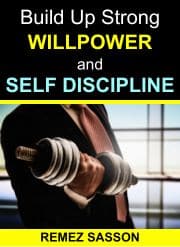
In my book, ‘Emotional Detachment for Happier Life’, I brought up an example of expressing detachment when standing in line, and then someone barges in, and goes to the front of the line.
In this example, I suggested to stay calm and not to get irritated.
A reader, raised concern that if we stay calm and poised all the time and make it a habit, how can we lead our lives in the real world?
Browse our online courses on meditation, positive thinking, overcoming procrastination, confidence, and freedom from distractions.
He further said that we get some peace when we detach ourselves to most of the things, but we are also at the danger of loosing the grip on our lives.
This reader was concerned that this behavior might make us unfit to stand up for our rights or fight against against wrongs.
He was concerned how can it be possible to balance everything, and how can it be possible to use the appropriate strategy at the appropriate time.
Detachment Does not Mean Passivity and Weakness
The emotional detachment I am talking about in book mentioned above doesn’t lead to indifference and the inability to handle the daily affairs of life. Quite the opposite.
I am talking about rising above anger and negative feelings, and not taking everything too personally. This leads to a healthier life and more control over your life.
In the above cited situation, the reader said, “From another perspective, wherein we raise our concern calmly, without affecting our moods, there is a chance that the person listens and goes back in line.”
This quite true. You may say something to the person who went to the front of the line, and you may choose not to say anything. You act out of common sense, not out of instinctive angry response.
In this case cited above, we might ask the person calmly, to go back and stand in line, or choose to say nothing. This depends on the person and the situation.
A person, who barges in, is usually impolite and inconsiderate, and if we say anything to him, he might react angrily and even violently. In this case, it is better not to say anything. It is not weakness or passivity. It is common sense.
In other situations, it might be the right thing to say something to this person.
There is another option.
You can consider this situation as an exercise in inner strength.
If you stay calm and say nothing, even if you very much want to say something, you strengthen your self control, patience and self-discipline.
You don’t abstain from saying anything because you are weak or afraid, but because you treat the situation as an exercise. It is like lifting dumbbells to strengthen your muscles.
Calmness Is not a State of Passivity
I would like to emphasize that calmness is not a state of passivity. When the mind and the emotions are calm there is more common sense when dealing with people, and one does not act angrily.
It might seem strange and a paradox, but a person with a calm and detached attitude can be very active in daily life, at work, career, sports or anything else.
There is a common misunderstanding about calmness and inner peace. People associate it with passivity, submissiveness, and lack of energy and zest, but this is completely wrong. True inner peace, builds inner strength, confidence and courage.
The fact is that when you work on building detachment and peace, indirectly, you also develop inner strength. Additionally, you expand the limits of your awareness and consciousness beyond the ego and the personality.
The mind can become peaceful, and even be without thoughts, but at the same time, you can work, talk and interact with people as usual.
There is inner peace, but externally, you continue to live actively. This might seem strange, but with inner work and training, one would find this to be true.
3 People 3 Behaviors
Imagine three persons in the same place and situation, at work, at a store, or at any other place.
One person is passive and meek. He slouches, and his back is bent. He looks down, avoiding eye contact, and talks in a timid voice.
The second person is a good actor, trying to look confident and strong, even if he isn’t.
The third person, possesses real inner peace and detachment, and therefore, is calm and relaxed. He stands and walks in a confident manner, with his back straight, is not afraid to look in the eye, and speaks clearly and in a confident voice.
How would these three people appear to other people, and how will people react, when meeting them?
Online Meditation Course: The Path to Awakening
Meditation techniques with guidance for finding inner peace, expanding consciousness, and awakening.
1) They would probably disrespect or disregard the first person, because he appears so meek and fearful.
2) They would probably listen to the second person and heed his words. However, since this is an act, in certain situations, this might not work, and they would know this is just an act.
3) The third person, being trained in calmness and detachment, is not intimated by anything. He feels calm and confident in any situation, broadcasting a sense of peace and strength. This behavior causes other people to instinctively respect him.
Browse our online courses on meditation, positive thinking, overcoming procrastination, motivation, confidence, and freedom from distractions.




